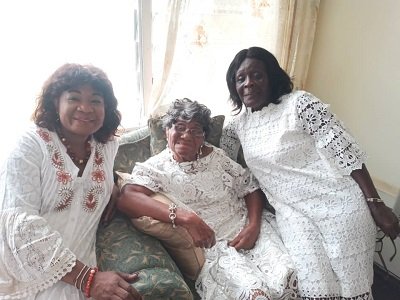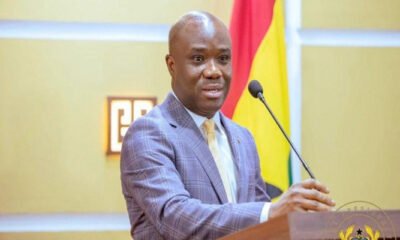News
Anna Gertrude Yankah clocks 105…still counting

With life expectancy at 65 years for female in Ghana, it is just divine providence that Madam Anna Gertrude Yankah, the former Headteacher of Korle Gonno Catholic Boys School, clocked 105 years on Tuesday, November 2.
Born November 2, 1916, at Atuabo in the Western Region, as twince, Anna Yankah outlived her sibling who passed in to eternity at the age of 90years.
Although the COVID-19 restriction on social gathering has limited the pomp and pageantry that would have gone with her birthday celebration, close family relations rallied around to celebrate her and to give glory to God for her longevity.
When The Spectator touched her home at Nungua on her birthday on Tuesday, Anna Yankah looked hale and hearty and was able to tell her birthday and names of her children.
Her last daughter Ms Baaba Yankah-Oduah, who is 68 years old praised God for the life of her mother.She made a passionate appeal to the government to honour people like her mother for their service to the country, since they could easily be identified on the pension payroll.
“The government can say thank you,” Mrs Yankah-Oduah said.
A Ghanaian world renowned Senior Consultant Cardiothoracic and Vascular Surgeon, whose uncle was Anna Yankah’s husband sent a congratulatory message to her from his base in German by phone told The Spectator that “it is a great day and great achievement in Ghana and in Africa for one to live up to105 years” and commended her for keeping her life fit.
Gertrude was born a twin at Atuabo in the Western Region to Mr Alfred Bimpeh-Sequ, a Customs Officer in the Gold Coast and Madam Elizabeth Bimpeh-Sequ (Nee Otu). In 1922, the family moved to Accra where she and her twin sister, Mary attended the Government Girls’ School.
After attaining her Standard Seven (7) certificate, her father vetoed that she train at the Midwifery School at the Korle Bu Hospital which she did but for only a semester.
She sat for the end of semester exams and excelled and when a friend of her father read the results on the hospital board, he quickly communicated the results to her father and it was at the time of her father congratulating her that she expressed the desire to quit the midwifery course and take up sewing as a profession.
She learnt to sew and was particularly busy during the Empire Day activities, sewing dresses for a great number of teachers for the march-pasts. In 1936, she incidentally sewed a shirt for Rev Fr Bronk at the Sacred Heart Parish at Derby Avenue.
Satisfied with her sewing prowess, he recommended her to teach Needle Work at the St. Joseph Catholic School at Adabraka.
In the course of her teaching, she sat for the Teachers Examination in 1938 and became a full-fledged teacher teaching other subjects besides needlework. In 1943 she was transferred back to the Sacred Heart School, Derby Avenue where she taught till 1948.
It was during that period that she married and became Mrs Anna Gertrude Yankah but popularly called Teacher Akweley. In 1948 she joined her husband also a Teacher (but in Anglican Schools) on transfer to Saltpond.
At Saltpond she taught with two lady teachers, Teacher Mary Mensah-Brown (later became Mrs. Hindson) and Teacher Emelia Attah-Fynn who had just started a newly founded Catholic Girls School. In 1950 her husband left the teaching field to join a newly formed Social Welfare and Mass Education Department recruiting trained teachers for Adult Education and Community Development at Winneba.
She, therefore, left Saltpond at the end of 1949 back for Accra to take up teaching again at the St. Joseph Catholic School Adabraka. In 1951 while her husband was engaged in Mass Education and Community Development programmes in the Central Region, she had to transfer to Cape Coast with the children and taught for six months at the Catholic Jubilee Boys School.
At Saltpond and Cape Coast she was affectionately known as Teacher Anna.
At the end of 1952 she decided to leave the teaching field and join her husband at Mass Education doing more of adult education at Winneba until 1955 and later at Akim Oda until 1957.
Between 1958 and 1960 she took a break from the Mass Education work and in 1961 went back to the teaching field this time as a Head Teacher in a government school (The Sarkodie Primary School) because there was no vacancy in the Catholic Schools at Koforidua for a head teacher.
So for the first time in her life she taught for seven years in a non-Catholic school.
Her husband left Social Welfare in 1967 to co-start the Commercial Department of the Ghana Broadcasting Corporation.
So in 1968, she was back in Accra and as a Head Teacher of the Korle Gonno Catholic Boys School.
A position she held until her retirement in 1974.
By Salifu Abdul-Rahaman
News
Damango wages war on shisha smoking among minors

Troubled and anxious citizens in Damongo of the Savannah Region have expressed concerns about the number of young people, believed to be under the age of 18, involved in ‘shisha’ smoking in pubs and drinking spots within the township.
Eyewitnesses say the minors were seen patronising nightlife venues, where Shisha smoking happen in the open.
The situation has sparked renewed public concern over the enforcement of child protection laws and regulations governing the operations of entertainment centres in the municipality and country as a whole.
An eyewitness, who spoke to The Spectator on conditions of anonymity for security reasons, noted that the situation was becoming increasingly common.
“This is not a one-off incident. It is becoming very common, but residents like us cannot openly report or speak about it because our lives will be at risk,” he said.
Under Ghanaian law, minors were prohibited from patronising Shisha.
Public health experts have consistently warned that shisha use exposes users to harmful substances that can negatively affect brain development, respiratory health, and overall well-being, particularly among young people.
The residents believe the alleged incidents point to broader challenges relating to youth supervision, substance abuse, and weak enforcement of existing regulations and have called on municipal authorities, security agencies, and regulatory bodies to intensify monitoring of pubs and entertainment centres to ensure compliance with the law.
In an effort to address the menace, Mr Salisu Be-Awurbi, the Savannah Regional Minister, has led public education campaigns, engaged security agencies, and supported enforcement actions to address the rising use of illicit substances in the region.
Wura Kelly Seidu Boresah I, the Chief of Damongo, has also called on all stakeholders including parents, community leaders, institutions, and young people to actively support efforts to curb drug abuse, warning that the rising consumption of hard drugs poses a serious health threat to the future of the youth in the Savannah Region.
He also cautioned individuals involved in the sale and distribution of illicit drugs to immediately desist from the practice, stressing that offenders will face arrest and prosecution in accordance with the law.
From Geoffrey Buta, Damongo, Savannah Region
Join our WhatsApp Channel now!
https://whatsapp.com/channel/0029VbBElzjInlqHhl1aTU27
News
Ga Mantse endorses initiative to end domestic voilence

Dr Theresa Baffour, an advocate for ending violence and Chief Executive Officer (CEO) of SAHM SAHW Foundation, has said that society plays a critical and pivotal role in breaking the cycle of domestic violence.
According to her, domestic violence is a major contributor of making women, who are mostly the victims, mentally derailed and unable to engage in economic activities.
She said this when the foundation called on the Ga Mantse, Nii Tackie Teiko Tsuru II, to solicit support for the initiative by the “Strong and Healthy Minds, Strong and Healthy Women” (SAHM SAHW) to combat domestic violence within the Ga State.
The visit was occasioned by the fact that domestic violence cases have become quite prevalent in the Ga communities and is retarding growth.
According to her, the canker was an impediment to national development because the victims were usually tortured and would have to go through series of therapies to return to the right state of mind.
Dr Baffour mentioned that Gender-Based Violence (GBV) places a mental toll on women, and was, therefore, important to break the cycle through comprehensive mental health support, crisis intervention and empowerment programmes in communities with high rates of GBV.
This intervention, she underscored, would help in empowering the denigrated victim of domestic violence to soundly heal, build and thrive.
Dr Baffour added that the initiative would provide holistic, trauma-informed mental health care and advocacy for young women affected by domestic violence.
According to her, the above statement would create safe spaces for healing and equipping them with entrepreneurial skills for renewed hope and empowered life.
The Ga Mantse pledged his support for the laudable initiative to combat domestic violence and also acknowledged the need to address it in the Ga State.
Further endorsement came from Justice Julia Naa-Yarley Adjei Amoah, Chief of Staff at the Office of the Ga Mantse, as she commended the team of SAHM SAHW Foundation for taking a bold step to end the canker in the Greater Accra.
She added that it was a step in the right direction to save vulnerable women from torture, stress and emotional abuse.
By Alfred Nii Arday Ankrah







